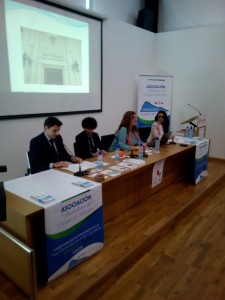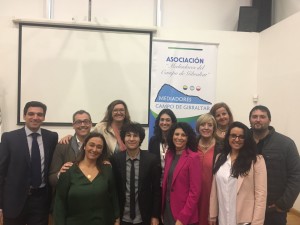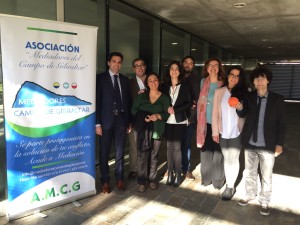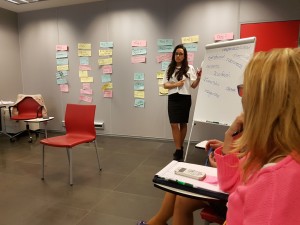Mediation is already here, and it came to stay. Each day there are more and more supporters of mediation – from legislators to public institutions, and professionals who are gaining more awareness about the potential of mediation.
However, it also has a long way to go. Those who decided to start working in the field need a big investment in their qualifications that imply both time and money and most of the times the question is the same for all of us: How can we make a living out of mediation?
While I am also in search of answers myself, I can share the approach that we took in the south of Spain.
The premise is this: either we manage to include the resource to mediation in people’s mindset and in our judicial and public institutions or mediation has little possibilities to succeed. This is to say, either we collaborate in order to implement mediation for all, or there will be no mediation at all.
The implementation of mediation (as a process and technique) implies a change in the paradigms that are governing the way we see conflicts as a society and the way we understand the judicial system as a way to resolve them. Before working in order to make a living out of mediation, we need to join forces, seek collaboration and work shoulder to shoulder with professionals, institutions and legislators in order to implement mediation in every layer of society.
With this approach in mind, a group of colleagues and myself decided to start a new project with the aim of implementing mediation in our region. On 1 January of this year (2017), in “El Campo de Gibraltar” (a region in south of Spain comprised of 7 cities and 3 judicial parties), hardly anyone knew of mediation.
It was then when we (myself and 39 other mediators) decided to start a professional association called the “Asociación de Mediadores del Campo de Gibraltar” (AMCG). With such a big group and literally nothing done about implementing mediation in our region, the challenge was huge. But with a lot of passion and long hours of hard work, in only 6 months we managed to do the following:
• Set up a Collaboration Network among the 40 professionals (lawyers, barristers and psychologists) who committed to promote mediation among their clients and derivate their clients willing to commit to mediation to the Association’s Panel of Mediators.
• Establish court-connected agreements with the Deans of Judges in two out of the
three judicial parties (we are expecting to sign the third one in the coming weeks) in order to implement pilot projects for court connected mediation in civil and commercial cases.
• Offer out of court mediation. (Would be good to explain more about this).
• Raise awareness about mediation and its benefits in our region by recording
monthly tv programs on the local tv, doing radio interviews, organizing local events for the international day of mediation and establishing several info-points that work regularly in four out of the seven cities of the region.
Recently, the first calls for mediation started arriving. Some were derived from our members who advised their clients to attend or consider mediation. Others came from people who heard about us on the tv, the radio or through our info-points.
I am aware about the fact that this is only the beginning of the journey. There are many challenges on the path ahead. Still, to me, having achieved these steps in such a short time is already a big accomplishment.
As a member of the Board of Directors of the AMCG and responsible of the Training and Quality Area, there are three keys points for this success.
No 1. Collaboration, Collaboration and More Collaboration.
I could not reiterate this more! I am convinced we need to work together in order to implement mediation in the collective mindset and in our judicial systems. This is the only way there can be mediation for all. Unless mediation gains public support and is implemented in all layers of society, there will be mediation for no one.
Our association is an example of the synergy that collaboration can create. Each member is an asset (some add IT skills, other personal contacts, connections with the press, events organisation and reach out to other professionals). Together, we established the process of design, preparation, promotion and implementation of our project.
We invested a lot of time in creating a solid working group of people, in getting to know each other, building trust and establishing the basic pillars and values of our project. Almost no one knew each other at the beginning but we sought for our common interests and joint goals as motivation to work together. At the end of the day, this is also a way of implementing the values of mediation (collaboration rather than competition) in order to make mediation work. To me, assuming this is crucial for mediators to succeed in the implementation of mediation in society.
No. 2. Putting shared values at the Core of the Project.
Working as a mediator is a middle to long term goal. In order to succeed, mediation requires highly qualified professionals and well structured institutions capable of delivering quality and competent services.
Quality of mediation, professionalism of service and ethics in conflict management and transformation are the core values of our project. As values, they serve to guide our decision making processes as a group. These core principles are prioritised in any action we take.
How do we do this, you may ask? In order to guarantee our value-based interventions, we established the following mechanisms:
♣ Strong Code of Conduct.
♣ Our own “Training Program” is adapted to the organization’s needs.
♣ Claims procedure available to judges,institutions, users and other members.
♣ Evaluation and monitoring system to ensure ongoing growth and learning.
♣ Co-mediation or observed mediations.
No.3. Making commitment a sine qua non condition.
Every member, in order to be enrolled in the panel of mediators of our Association, needs to sign our “Code of Conduct”, committing to follow those mechanisms and collaborate in the project, adding whatever personal, professional or material support they could contribute and bring added value to the project. The more members we have, the richer the project becomes.
There is a lot ahead of us, and we are passionate and dedicated to take those extra steps to ensure the project implementation leads to positive outcomes. This is how we can raise the bar of mediation in our region.
“Our project hopes to be a message to society that collaboration is possible, that mediation is powerful.”
I believe that eventually, making a living out of mediation shall be the consequence for those of us who really worked to make this happen.
Virginia Vilches Such.
Lawyer, Mediator and Trainer in Mediation.
Advisor at NEIRE III Research Project.
Phd Candidate, University of Seville.
Responsible of Training and Quality Area at “Asociación de Mediadores del Campo de Gibraltar”.
YMI Ambassador.
________________________
To make sure you do not miss out on regular updates from the Kluwer Mediation Blog, please subscribe here.







Dear Virginia,
I am so pleased to come across your blog and wishing you and your group the very best success in all your endeavours to make Mediation work in Gibraltar and in the whole of Spain.
I am now back in Sydney since 1999 but lived in Spain for a couple of years so that I can introduce to my daughters their other culture. I have been a mediator since 1984 and very passionate about my work and its flexibility with the lifestyle changes or circumstances that I have in my professional and personal life journey. Your enthusiasm and determination is truly remarkable and I am sure you will find success and satisfaction in your chosen professions.
Kindest and warmest regards,
Josephine. WMO 2017 Panel,
Accredited Mediator – Community Justice Centres, NSW Government
Dear Josephine,
I really appreciate your message, thank you for your words of support that I will send to my colleagues as well. I am really interested in your work as mediator, both in Australia and in Spain if you also worked here. I would love to get to know more about our experience in the field.
Indeed, at some point of my life I just decided I would dedicate my life to mediation, to serve as an agent of change for empowering people and society to become more just and fair. To me, mediators are just that agent that seed the space for parties to decide their own path.
I know there is a long path ahead, but luckily enough I am not alone on the way. I met many wonderful people, just as my 37 colleagues who are also working hard to make mediation happen. Now, mediation is not just another way of resolving conflict. To me those who support mediation are also supporting a change in paradigms, are claiming empowerment and ownership for people to get the control of their own life. This is not a superficial change but a deep transformation of the self and society.
This is precisely why it is difficult, this is precisely why it is worth trying.
That having being said, I am trying to get days off and attend the WMS 2017, I hope to have the chance to meet you in person there.
Best regards,
I have to compliment you and your team on the amazing journey,hard work and dedication t spread the gospel of mediation in that particular region. I wish you all the best . Keep up the good work.
Dear Virginia, I’m a young mediator who recently moved to Andalucia. I was hoping to find more about your group but seems like the website isn’t responsive. Does the group still exist? Has it changed its name? I would be happy to connect and learn from your experience as a mediator in Spain.
Inna
(inna (dot) didenko (at) gmail (dot) com)